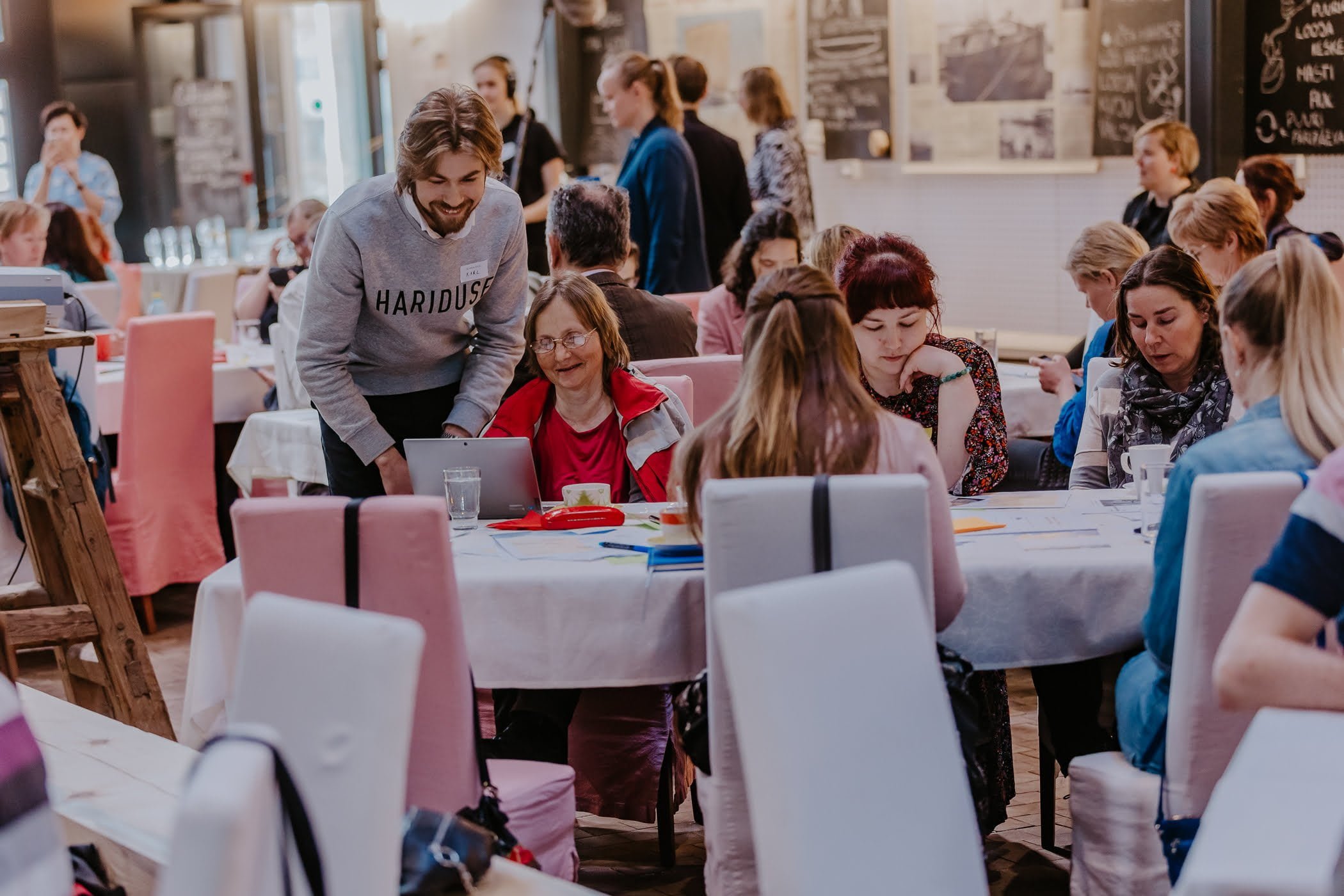WHAT IS A CITIZENS PANEL?
A Citizens’ Panel is a deliberative democracy format in which decisions are made by a cross-section of society – a so-called mini-public. Because a citizens’ assembly is grounded in the best available science, uses collective wisdom, and seeks to reach common ground, it is an empowering decision-making method for citizens and communities.
A citizens’ panel helps ensure that the voices of everyday people are represented in shaping societal life. Every resident has an equal chance of being selected to participate, as participants are chosen through a random sampling process.
Citizens’ panels are considered by democracy innovators to be one of the most impactful formats, as the power of collective wisdom has helped find solutions to many long-standing or seemingly deadlocked societal issues.


Around the world, citizens’ assemblies are increasingly being commissioned by the public sector to make decisions on climate action, improve urban living environments, and explore softer topics in schools, museums, and other educational institutions. A permanent citizens’ assembly exists, for example, in the city of Paris, where a “mini-Paris” recently drafted a regulation to prevent and alleviate homelessness in the megacity. In Brussels and Milan, standing citizens’ assemblies monitor the implementation of city climate policies. Citizens’ assemblies are also used for wealth redistribution — for instance, to decide on the allocation of private foundation funds in Austria or on the use of oil wealth in Norway.
Within the European Union, citizens’ assemblies (citizen panels, citizen forums) have become a regular way of involving everyday citizens in decision-making on important issues. This year, a citizens’ assembly was held on the EU budget; upcoming assemblies will focus on biodiversity from a youth perspective, and on intergenerational solidarity.
PREVIOUS CITIZENS' ASSEMBLIES in estonia
In Estonia, citizens’ assemblies have been held five times, once at the national level. Previous assemblies have addressed the role of green spaces in mitigating climate impacts in Tallinn (2023), sustainable mobility in Tartu (2022), young people’s perspectives on the just transition in Ida-Virumaa (2021), forestry (2019), and political party financing and elections (the 2013 Citizens’ Assembly).
The Ida-Viru Youth Climate Assembly provided input for the just transition plan and brought the voices of local youth into the relevant committee at the Ministry of Finance. The Tartu Climate Assembly offered the city valuable proposals for calming traffic and preserving biodiversity in urban design and maintenance. The Tallinn Green Capital Assembly gave the city government a strong mandate to continue protecting, connecting, and expanding green areas. Thanks to the 2013 Citizens’ Assembly, Estonia gained the right of public initiative to the parliament and simplified the process of forming a political party.
Citizens' Assembly for a Green Capital (2023)
As the European Green Capital, Tallinn tested a climate-focused citizens’ assembly for the first time in October and November 2023, introducing it as an innovative method of citizen engagement. A cross-section of Tallinn’s population — 45 residents — came together over five days across three weekends to deliberate on how to turn the city’s green areas into an inviting, cohesive whole. The assembly was held in Estonian, Russian, and English.
climate assembly of tartu (2022)
In April–May 2022, Tartu held its first climate assembly on the topic of sustainable mobility. It was attended by 45 randomly selected residents (a so-called “mini-Tartu”) who represented a cross-section of the city’s population in terms of gender, age, place of residence, employment status, and native language.
The climate assembly days were designed in a way that individual opinions and experiences were enriched through group discussions and ultimately transformed into collective proposals. Participants contributed as residents, bringing their lived experience and values to the table — they were not expected to be experts or to become ones.
VARASEMAD RAHVAKOGUD EESTIS
Eestis on rahvakogu korraldatud viiel korral, riiklikul tasandil ühel korral. Varasemad rahvakogud on käsitlenud Tallinna rohealasid kliimamõjude leevendamisel (2023), säästvat liikuvust Tartus (2022), noorte hinnangut Ida-Virumaa õiglasele üleminekule (2021), metsandust (2019) ning erakondade rahastamist ja valimisi (2013 Rahvakogu).
Ida-Viru noorte kliimakogu andis sisendit õiglase ülemineku kavasse ning tõi maakonna noorte hääle vastavasse komisjoni Rahandusministeeriumis. Tartu kliimakogu andis linnale väärt ettepanekuid liikluse rahustamiseks ning elurikkuse hoidmiseks linnakujunduses ja -hoolduses. Tallinna rohelise pealinna rahvakogu andis linnavalitsusele tugeva mandaadi jätkata rohealade ühendamist, kaitsmist ja ühendamist. Tänu 2013. aastal toimunud rahvakogule tekkis meil rahvaalgatusõigus parlamendile ja lihtsustus erakonna loomine.
ROHELISE PEALINNA
RAHVAKOGU (2023)
Olles Euroopa Roheline Pealinn, katsetas Tallinn 2023. aasta oktoobris ja novembris esmakordselt kliimateemalist rahvakogu kui uuenduslikku kodanike kaasamise viisi. Tallinna rahvastikust läbilõike moodustanud 45 elanikku kogunes viiel päeval kolme nädalavahetuse jooksul, et arutada selle üle, kuidas muuta pealinna rohealad kutsuvaks tervikuks. Rahvakogu toimus eesti, vene ja inglise keeles.
Tartu kliimakogu (2022)
2022. aasta aprillis-mais toimus Tartu esimene kliimakogu säästva liikuvuse teemal. Osales 45 juhuvalimi teel valitud tartlast (nn mini-Tartu), kes moodustasid läbilõike Tartu linna elanikest, arvestades sugu, vanust, elukohta, tööalast hõivatust ja emakeelt.
Tartu kliimakogu päevad said disainitud nii, et individuaalne arvamus ja kogemus rikastus rühmaaruteludes ning muutus lõpuks kollektiivseks ettepanekuks. Kliimakogus osalejad panustasid elanikena oma elukogemuse ja väärtustega, neilt ei eeldatud eksperdiks olemist ega selleks muutumist.
MENU:
CONTACT:
Email: rahvakogud@dd.foundation
Address: Raekoja plats 1, Tartu; Telliskivi 60a, Tallinn



